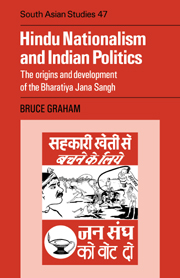Book contents
- Frontmatter
- Contents
- List of illustrations
- List of tables
- Preface
- List of abbreviations
- 1 The challenge of Hindu nationalism
- 2 The immediate origins of the Jana Sangh
- 3 The doctrinal inheritance of the Jana Sangh
- 4 The leadership and organization of the Jana Sangh, 1951 to 1967
- 5 The Jana Sangh as a Hindu nationalist rally
- 6 The Jana Sangh and interest-group politics
- 7 The Jana Sangh in electoral politics, 1951 to 1967
- 8 Conclusion
- Appendix I
- Appendix II
- Appendix III
- Appendix IV
- Select Bibliography
- Index
- CAMBRIDGE SOUTH ASIAN STUDIES
- Frontmatter
- Contents
- List of illustrations
- List of tables
- Preface
- List of abbreviations
- 1 The challenge of Hindu nationalism
- 2 The immediate origins of the Jana Sangh
- 3 The doctrinal inheritance of the Jana Sangh
- 4 The leadership and organization of the Jana Sangh, 1951 to 1967
- 5 The Jana Sangh as a Hindu nationalist rally
- 6 The Jana Sangh and interest-group politics
- 7 The Jana Sangh in electoral politics, 1951 to 1967
- 8 Conclusion
- Appendix I
- Appendix II
- Appendix III
- Appendix IV
- Select Bibliography
- Index
- CAMBRIDGE SOUTH ASIAN STUDIES
Summary
Why did the Jana Sangh fail to become a major force in the politics of post-independence India, despite its claim to be the true representative of the national aspirations of the Hindus? The simple answer is that it failed to transcend the limitations of its origins. Its close initial ties with the Hindi-speaking heartland were, in the long run, a serious disadvantage; from the outset, the party was preoccupied with northern issues such as the promotion of Hindi, the defence of refugee interests, and energetic resistance to Pakistan. In addition, its interpretation of Hinduism was restrictive and exclusive; its doctrines were inspired by an activist version of Hindu nationalism and, indirectly, by the values of Brahmanism rather than the devotional and quietist values of popular Hinduism.
These problems were not insoluble and had Shyama Prasad Mookerjee, the party's first President, not died so unexpectedly in June 1953, he might well have persuaded his followers to be more expansive and flexible, and more pragmatic and adventurous in developing new policies; he undoubtedly sympathized with their Hindu nationalism and their distrust of Pakistan, but as a liberal constitutionalist and a Bengali he was naturally resistant to the authoritarian bent and the Hindi chauvinism of his northern colleagues. Had he lived longer, he would have been well equipped to exploit the opening in the party system created by Nehru's attempt to reorientate the Congress Party.
- Type
- Chapter
- Information
- Hindu Nationalism and Indian PoliticsThe Origins and Development of the Bharatiya Jana Sangh, pp. 253 - 258Publisher: Cambridge University PressPrint publication year: 1990



